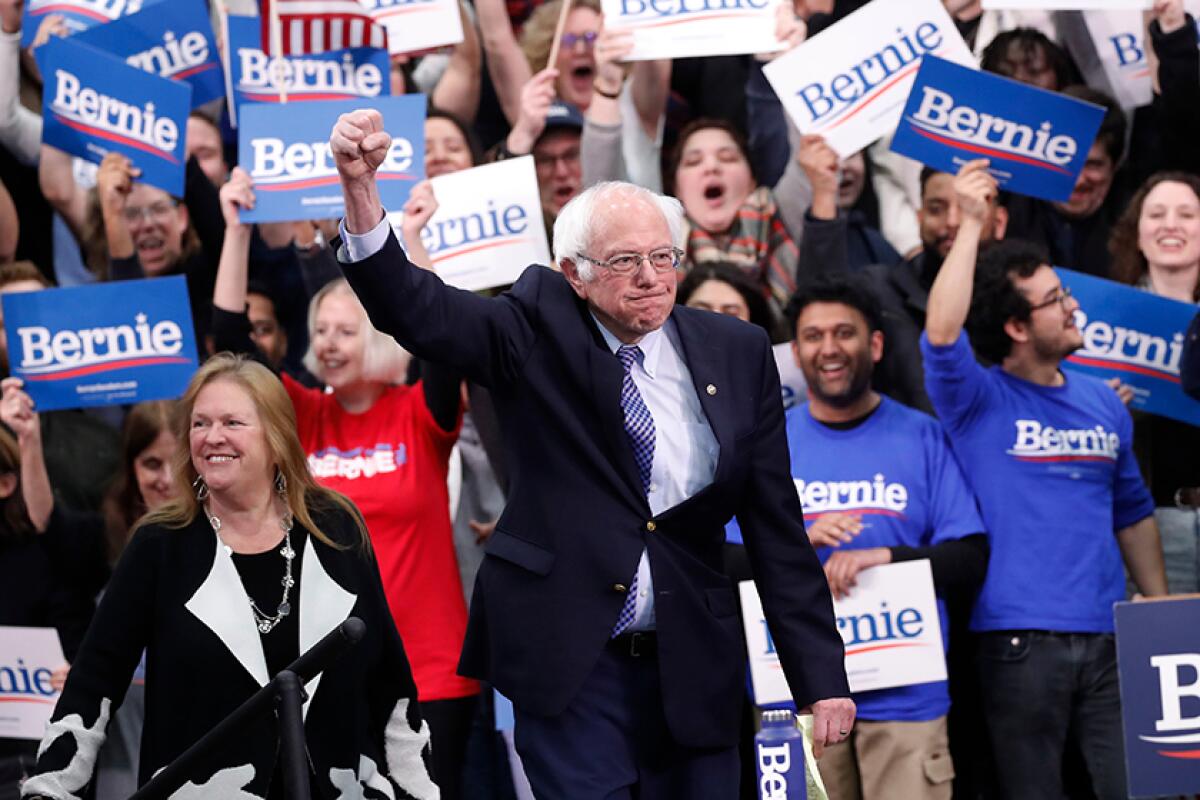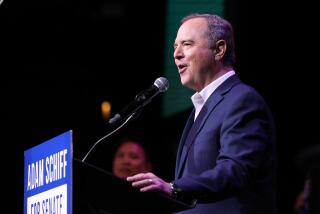With Sanders at the top of the ticket, will Democrats keep the House seats they won in moderate districts?

- Share via
WASHINGTON — Sen. Bernie Sanders’ position atop the field of candidates hoping to replace President Trump in November has some members of the Democratic Party worried that his liberal policies would cost them control of the House and a chance at grabbing the Senate from Republicans this fall.
They argue that while Sanders’ nomination as the Democratic presidential candidate would drive enthusiasm among liberal voters eager to defeat Trump, it would be a dramatic liability in conservative parts of the country where Democrats recently won seats that gave them control of the House.
“That scares the daylights out of me,” said Rep. Juan Vargas (D-San Diego), who has endorsed former New York Mayor Mike Bloomberg. “In these districts we barely won, if [Democratic incumbents] get labeled a socialist, and if our candidate is running as a democratic socialist, these guys would lose. There’s no doubt in my mind.”
Their worry is that Trump would tie every elected Democrat in the country to the most progressive policies of Sanders — an independent from Vermont — including the Green New Deal and Medicare for all. Several Democrats won their seats in 2018 in moderate Democratic or even slightly Republican parts of the country by touting less-progressive policies and a go-slow approach on issues such as healthcare and climate change.
Vargas and Democrats with similar concerns have begun endorsing other presidential candidates whose message they find less combustible — particularly former Vice President Joe Biden and Bloomberg, both of whom have generated opposition from progressives.
On Capitol Hill, Democrats are girding for a nomination process that could last months and get messy as the party decides whether it is going to pursue a progressive nominee or more moderate one. And coming out of the 2016 race — when Sanders’ supporters never warmed to the eventual nominee, Hillary Clinton — congressional Democrats are increasingly nervous that the party will repeat its mistake and not unify in time for the general election.
Perhaps mindful of 2016, many elected Democrats have chosen to not endorse yet during the primary or have said that they’ll back whichever horse wins the nomination. They have argued that any Democratic nominee would play better among their voters at home than with Trump, whose budget released last week sparked new opposition for its proposed cuts to healthcare and education programs that Democrats support.
“Any responsible Democratic [candidate] who speaks against that kind of road map to disaster is going to play very well in my district,” Rep. Madeleine Dean (D-Pa.), who represents a historically Republican area outside of Philadelphia that is trending Democratic.
But Democratic House members who won in 2018 in parts of the country where Trump is popular will probably have to convince at least some of their voters to split their ballot, supporting both them and the Republican president. That kind of divided vote, always difficult, could be an even tougher pitch with Sanders as the Democratic presidential nominee.
“At the end of the day, who is at the top of the ticket defines the party agenda,” said Rep. Ami Bera (D-Elk Grove), who has endorsed Biden and helps lead the Democrats’ campaign group responsible for getting the most vulnerable Democrats reelected. “A lot of these folks in competitive districts didn’t run on Medicare for all, and those are tough policies [to defend]. Having a socialist — that’s how he describes himself, a democratic socialist — probably makes it a tougher race.”
Sanders and his supporters argue those Democrats have nothing to worry about. A Sanders campaign, they say, would drive unprecedented turnout from once-disenfranchised voters.
“When you have a large voter turnout, which is I think what our campaign is going to generate, it’s going to help everybody from the top of the ticket to the bottom of the ticket,” Sanders said in a brief interview last week as he left the campaign trail to cast a vote in the Senate.
Rank-and-file Democrats can break with Sanders when they need to, argues Rep. Ro Khanna (D-Fremont), national co-chair of Sanders’ campaign. He offered up himself as an example to soothe skittish Democrats. He represents Silicon Valley while still helping lead a campaign that calls for breaking up tech companies and taxing the wealthy.
“What Sanders will do is give our party a unifying theme, give our party the best chance of winning voters without college degrees, independents, rural voters, getting young people out. He’ll be the strongest top of the ticket,” he said. “Obviously, people don’t have to run a clone race in their own districts.”
But the Democrats who are worried about Sanders’ rise argue that the base is already enthusiastic to cast their ballot this November because of one man who is not a Democrat at all.
“The energy all comes from Trump,” said Rep. Scott Peters (D-San Diego), who is supporting Bloomberg. On the Democratic side, “it can be the most milquetoast candidate. It’s not about an orator. It’s about someone who is credible.”
Perhaps seeing the opening on Capitol Hill, Bloomberg has engaged a significant effort to curry congressional endorsements. He has visited with several groups of lawmakers, including moderates and pro-business Democrats who are likely to be receptive to his message. In recent weeks, he has garnered at least 13 endorsements from congressional Democrats, particularly among those whose campaigns he heavily contributed to two years ago. Sanders has at least eight endorsements from lawmakers.
But Bloomberg has faced his own backlash, including from the highest-profile freshman Democrat in Congress.
Rep. Alexandria Ocasio-Cortez (D-N.Y.), who has endorsed Sanders, said Bloomberg’s rise — fueled by his self-funded campaign ads blanketing airwaves around the country — “creates tough kinds of conflict-of-interest questions.”
“We know that money in politics is a huge problem, a massive problem,” she said.
Worry about Sanders’ nomination merely comes with being the front-runner, Ocasio-Cortez said.
“If [Sen. Amy] Klobuchar or whoever was the front-runner right now, there would be a lot of stress about whether progressives would unify around that. Similarly, with Bernie being the front-runner, there’s going to be stress around more conservatives rallying behind that nominee,” she said.
Both House Speaker Nancy Pelosi (D-San Francisco) and Senate Minority Leader Charles E. Schumer (D-N.Y.) have publicly downplayed any worry about how the primary will shake out.
“There is always lots of sturm and drang,” Schumer said last week. “You will see in a few months Democrats will be strongly united together and we will be focused like a laser on beating Donald Trump.”
More to Read
Get the L.A. Times Politics newsletter
Deeply reported insights into legislation, politics and policy from Sacramento, Washington and beyond. In your inbox three times per week.
You may occasionally receive promotional content from the Los Angeles Times.










